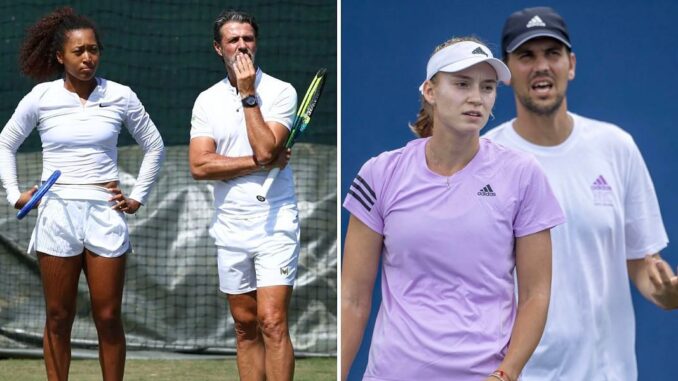
As the 2025 Wimbledon Championships unfold on the pristine grass courts of the All England Club, Elena Rybakina, the 2022 champion, steps into the spotlight not only for her powerful serve and stoic demeanor but also for a lingering off-court saga involving her former coach, Stefano Vukov. The controversy, which has simmered since 2023, reached a boiling point earlier this year when the WTA imposed a one-year ban on Vukov for breaching its code of conduct, a decision that has drawn polarizing opinions across the tennis world. Naomi Osaka’s coach, Patrick Mouratoglou, recently weighed in, offering a perspective that underscores the complexity of the situation: “Elena Rybakina is an adult… It’s hurt her.” As Rybakina prepares to face Elina Avanesyan in her opening match on July 1, her journey reflects both personal strength and the challenges of navigating a tumultuous professional relationship.
Rybakina and Vukov’s partnership, which began in 2019, was a cornerstone of her meteoric rise. From a ranking outside the top 200, the Kazakh star climbed to world No. 3, clinching the 2022 Wimbledon title and reaching the 2023 Australian Open final under Vukov’s guidance. Their collaboration yielded WTA 1000 titles in Indian Wells and Rome, and Rybakina credits Vukov’s intense coaching style for complementing her reserved personality. “She expects energy from me, definitely,” Vukov said in 2023, describing their dynamic as “fire to her ice.” Yet, his animated behavior—marked by shouting and critical gestures during matches—drew scrutiny, notably from former player Pam Shriver, who urged Rybakina to find a coach who “speaks and treats her with respect at all times.” Rybakina defended him fiercely, stating on Instagram, “Stefano has believed in me for many years, before anyone else did… I would never accept a coach that didn’t respect me and all our hard work.”
The partnership unraveled in August 2024, just before the US Open, when Rybakina announced their split, citing no specific reasons. However, Vukov’s actions in New York—reportedly flooding her phone with over 100 calls and messages and lingering in her hotel lobby—prompted concerns from her inner circle, leading to a WTA investigation. The probe, concluded in February 2025, found Vukov guilty of “abusive conduct,” including verbal abuse like calling Rybakina “stupid” and telling her she’d “still be in Russia picking potatoes” without him. WTA chief Portia Archer described their relationship as “toxic” and one of “dependence,” citing instances of mental abuse and harassment. Vukov, now 38, was banned for a year, barred from obtaining credentials for WTA events and Grand Slams, a decision he is appealing through arbitration. Despite the ban, Rybakina rehired him in January 2025, only for the WTA to enforce his suspension, preventing him from accessing tournament facilities.
Mouratoglou’s comments, made in an interview ahead of Wimbledon, highlight the delicate balance between personal choice and professional consequences. “There is a justice in this country that says what is right and wrong. I don’t think any other entity should be entitled to judge people,” he said, emphasizing Rybakina’s autonomy as an adult. Yet, he acknowledged the toll the situation has taken: “It’s hurt her. She doesn’t have the same results by far.” Indeed, Rybakina’s 2024 season was marred by injuries and withdrawals, including from the Paris Olympics and Indian Wells, with a back injury and reported insomnia linked to the stress of the controversy. Her victory at the 2025 Internationaux de Strasbourg, where she defeated Liudmila Samsonova 6-1, 6-7(2), 6-1, marked her first title in 13 months, a testament to her resilience. “Thank you to my fitness coach, physio, Stefano, and of course my family,” she said post-match, subtly acknowledging Vukov’s ongoing influence despite his absence from tournaments.
Rybakina’s decision to reintegrate Vukov, now acting as her agent, has sparked debate. She has consistently denied abuse allegations, stating at the Australian Open, “I have never made any complaints about Vukov or any of these things, and I always said that he never mistreated me.” Her frustration with the WTA’s process was evident in Doha, where she said, “I’m just disappointed with the situation and how the process went.” After parting with Goran Ivanisevic, who was blindsided by Vukov’s return, Rybakina hired Davide Sanguinetti, who occasionally consults with Vukov. “We usually train together between tournaments, not when the tournament is on,” she clarified at the French Open, where she reached the third round.
As Rybakina faces Avanesyan, whom she defeated 6-4, 7-6 in Rome in 2022, her focus remains on reclaiming her Wimbledon glory. The No. 4 seed’s powerful game suits the grass, but her path is fraught with challenges, including a potential clash with Iga Swiatek or Jelena Ostapenko. Off the court, the Vukov saga continues to cast a shadow, with fans and commentators divided. Some, like Mouratoglou, argue for Rybakina’s right to choose her team, while others, including Shriver, see the WTA’s intervention as a necessary stand against toxicity. Rybakina’s stoic resolve—evident in her terse press conferences and unwavering defense of Vukov—mirrors her on-court tenacity, making her a compelling figure at Wimbledon 2025, where her quest for a second title intertwines with a narrative of personal agency and redemption.
Leave a Reply